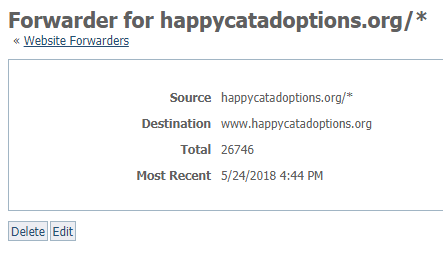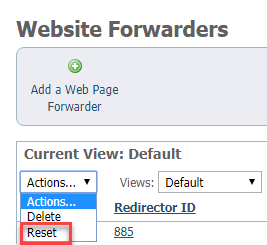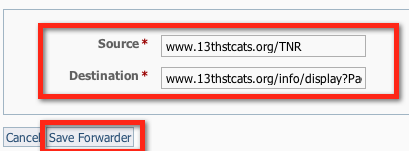Only volunteers with the role of Content Administrators can redirect your website or your website pages.
When forwarders are used
Forwarders are used to take a visitor from the current page to a different page:
- Redirect an entire domain/hostname to another site (e.g., something.yourdomain.org/* to another.domain.org). For instance, you might want to create an easy-to-remember URL for your website, such as an acronym of your organization's name dot org and redirect visitors to your actual site.
- Redirect one page to a page on another site (e.g., /test.html to other.domain.org/testing.htm). When you create a new webpage, you can add the name of the page it replaces to the Redirect box, and thus redirect visitors to the new page.
- Redirect one page to another page on the same site (e.g., /search.html to /animals/search.php). For instance, you might want to catch visitors' interest by naming a page Black dogs rock but redirect that page to your All dogs rock page.
- Redirect a custom web page to another web page (e.g., something.rescuegroups.org/info/display?PageID=51 to another.domain.org/testing.htm). For instance, you might create a custom web page for an event, then redirect the user later to your events calendar.
Preventing broken links
Broken Links are created when web pages are moved or deleted. It's possible you may create a broken link when you move your organization's domain name over to your new RescueGroups.org website. You can prevent having a broken link by using forwarders. Forwarders can be created so that when a request is made for a page that no longer exists, visitors are redirected to a different page.
For example, if on your current website, your adoption page is http://www.animalfriends.org/adopt.html, but on your RescueGroups.org site the URL will be http://www.animalfriends.org/info/adoption.php, you can create a redirect so the old link will still be valid.
Track Advertising Campaign Efficiency
Forwarders can be used creatively for tracking advertisement campaigns. For example, your organization may advertise a special URL of http://www.animalfriends.org/spayneuter. You can then create a redirect from that URL to a web page you create.
Check back during the campaign to see how many redirects have occurred. The number of redirects can be found on the Web Site Forwarders page. Go to Website > Forwarders then click the redirect number for the redirect you want to review. At the resulting page, you'll see the source URL, the destination URL, and the total number of redirects, along with the date of the last redirect. Here's an example from one of our organizations.
You can reset the “counter” on the forwarder by checking the correct forwarder in the list of forwarders and clicking Reset from the drop-down menu. Just as with other data lists in your account, you can select all to complete the action (delete or reset) for all forwarders.
How to Add A Web page Forwarder Using your own Domain
- Source, enter the URL people will type into their browser
- In this example a "friendly URL" for use on marketing materials: www.13thstcats.org/TNR
- Destination, is the page you would like them to be forwarded to
- In this example, the web page: www.13thstcats.org/info/display?PageID=5373
- Save Forwarder



